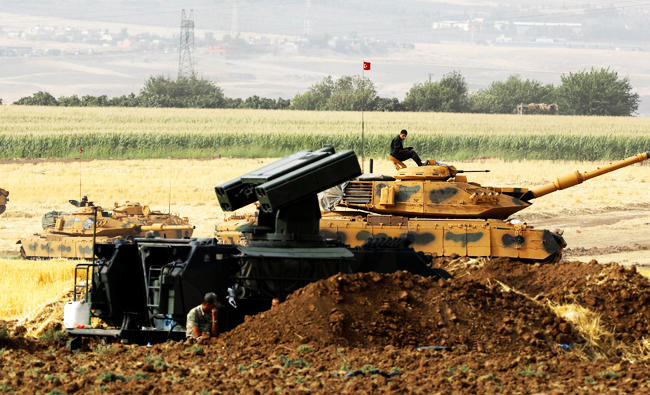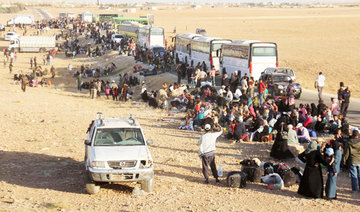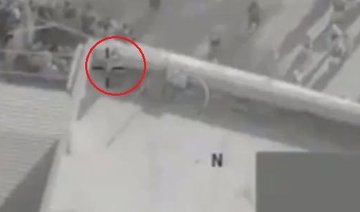ANKARA: Turkey’s military deployment along its southern border suggests an imminent operation in Syria’s Idlib province alongside the Ankara-backed Free Syrian Army (FSA).
During talks last week in the Kazakh capital Astana, Russia, Iran and Turkey agreed to establish “de-escalation zones” in various parts of Syria for six months, including rebel-held Idlib, where Ankara will send troops to monitor implementation of the deal.
Turkey’s pro-government newspaper Yeni Safak on Friday reported that the army has ordered FSA-linked groups to prepare for an operation in Idlib.
Under the plan, 25,000 Turkish troops will reportedly be accompanied by about 5,000 FSA fighters, although military experts say the number of Turkish troops is exaggerated.
Hayat Tahrir Al-Sham (HTS), a rebel alliance that controls much of Idlib and is dominated by former Al-Qaeda affiliate Jabhat Fateh Al-Sham, has said it does not recognize the Astana agreement and would resist any operation in the province.
Serhat Erkmen, a Middle East expert at the Ankara-based 21st Century Turkey Institute, said he expects a Turkish military operation in Idlib very soon.
“Initially, elements linked to the FSA will play a greater role. Whether they can accomplish the expected result depends on the intensity of the fighting,” Erkmen told Arab News.
“The strategy Turkey adopts for this operation will determine whether HTS resists. If HTS feels the main objective is to clear it and its supporters from Idlib instead of de-escalating conflict between the regime and opposition forces, a fierce battle is inevitable,” he said.
“I don’t expect a serious flow of militants into Turkey following this operation, because Ankara has already taken tight security measures along the border.”
Turkey has almost finished a 700-km-long wall along its border with Syria, backed by unmanned drones, sophisticated surveillance cameras, fiber optic sensors and watchtowers.
Mete Sohtaoglu, an expert on Middle East and global jihadist movements, said Ankara has given FSA fighters Special Forces and commando training, as well as weapons and military vehicles.
“FSA units, which will be formed by local fighters, will act as spearhead forces,” he told Arab News.
“They’ll stand at checkpoints and crossroads in Idlib to provide security for the Turkish military,” Sohtaoglu added.
“During the first stage, 500-600 Turkish troops and commando units may be expected to enter Idlib,” he said.
“Since July, the Turkish army has been carrying out feasibility studies there. There are three military camps in Idlib probably to deploy Turkish troops, and the FSA will be supported from there if necessary,” Sohtaoglu added. “The only disadvantage is that frequent assassinations and bombings occur in the region.”
He said armed groups are likely to negotiate with Ankara because no one wants to fight the Turkish army.
“If Turkey prefers a military installation in Idlib, HTS will move to other regions to fight regime or Kurdish forces, or it will disband for the sake of Idlib’s residents,” he added.
But other experts said if HTS decides to fight Turkish troops, the conflict will likely be long and intense.
Ankara conducted Operation Euphrates Shield between August 2016 and March 2017 to expel Daesh from the border and prevent Syrian Kurdish forces from establishing a territorial belt.
During that operation, Turkey lost 67 soldiers and the FSA 600 fighters, mainly due to Daesh suicide attacks.
Turkish military prepares for Idlib operation
Turkish military prepares for Idlib operation

Hamas says ‘new’ Israeli conditions delaying agreement on Gaza ceasefire

- “Occupation has set new conditions concerning withdrawal (of troops), the ceasefire, prisoners, and the return of displaced people,” Hamas said
JERUSALEM: Hamas accused Israel on Wednesday of imposing “new conditions” that it said were delaying a ceasefire agreement in the war in Gaza, though it acknowledged negotiations were still ongoing.
Israel has made no public statement about any new conditions in its efforts to secure the release of hostages seized on October 7, 2023.
Indirect talks between Israel and Hamas, mediated by Qatar, Egypt and the United States, have taken place in Doha in recent days, rekindling hope for a truce deal that has proven elusive.
“The ceasefire and prisoner exchange negotiations are continuing in Doha under the mediation of Qatar and Egypt in a serious manner... but the occupation has set new conditions concerning withdrawal (of troops), the ceasefire, prisoners, and the return of displaced people, which has delayed reaching an agreement,” the Palestinian militant group said in a statement.
Hamas did not elaborate on the conditions imposed by Israel.
On Monday, Israeli Prime Minister Benjamin Netanyahu told parliament that there was “some progress” in the talks, and on Tuesday his office said Israeli representatives had returned from Qatar after “significant negotiations.”
Last week, Hamas and two other Palestinian militant groups — Islamic Jihad and the leftist Popular Front for the Liberation of Palestine — said in a rare joint statement that a ceasefire agreement was “closer than ever,” provided Israel did not impose new conditions.
Efforts to strike a truce and hostage release deal have repeatedly failed over key stumbling blocks.
Despite numerous rounds of indirect talks, Israel and Hamas have agreed just one truce, which lasted for a week at the end of 2023.
Negotiations have faced multiple challenges since then, with the primary point of disagreement being the establishment of a lasting ceasefire in Gaza.
Another unresolved issue is the governance of post-war Gaza.
It remains a highly contentious issue, including within the Palestinian leadership.
Israel has said repeatedly that it will not allow Hamas to run the territory ever again.
In an interview with The Wall Street Journal last week, Netanyahu said: “I’m not going to agree to end the war before we remove Hamas.”
He added Israel is “not going to leave them in power in Gaza, 30 miles from Tel Aviv. It’s not going to happen.”
Netanyahu has also repeatedly stated that he does not want to withdraw Israeli troops from the Philadelphi Corridor, a strip of land cleared and controlled by Israel along Gaza’s border with Egypt.
The war in Gaza was sparked by Hamas’s unprecedented October 7 attack on Israel, during which militants seized 251 hostages.
Ninety-six of them are still being held in Gaza, including 34 the army says are dead.
The attack resulted in 1,208 deaths, mostly civilians, according to an AFP tally of Israeli official figures.
Israel’s retaliatory campaign has killed at least 45,361 people in Gaza, a majority of them civilians, according to figures from the Hamas-run territory’s health ministry that the UN considers reliable.
Syria authorities say 1 million captagon pills torched

- Forces pour fuel over and set fire to a cache of cannabis, the painkiller tramadol and around 50 bags of pink captagon pills in the capital’s security compound.
DAMASCUS: Syria’s new authorities torched a large stockpile of drugs on Wednesday, two security officials told AFP, including one million pills of the amphetamine-like stimulant captagon, whose industrial-scale production flourished under ousted president Bashar Assad.
“We found a large quantity of captagon, around one million pills,” said a member of the security forces, who asked to be identified only by his first name, Osama. An AFP journalist saw forces pour fuel over and set fire to a cache of cannabis, the painkiller tramadol and around 50 bags of pink captagon pills in the capital’s security compound.
UK to host Israel-Palestine peace summit

- PM Starmer drawing on experience working on Northern Ireland peace process
- G7 fund to unlock financing for reconciliation projects
LONDON: The UK will host an international summit early next year aimed at bringing long-term peace to Israel and Palestine, The Independent reported.
The event will launch the International Fund for Israeli-Palestinian Peace, which is backed by the Alliance for Middle East Peace, containing more than 160 organizations engaged in peacebuilding between Israelis and Palestinians.
Prime Minister Keir Starmer, a former human rights lawyer who worked on the Northern Ireland peace process, ordered Foreign Secretary David Lammy to begin work on hosting the summit.
The fund being unlocked alongside the summit pools money from G7 countries to build “an environment conducive to peacemaking.” The US opened the fund with a $250 million donation in 2020.
As part of peacebuilding efforts, the fund supports projects “to help build the foundation for peaceful co-existence between Israelis and Palestinians and for a sustainable two-state solution.”
It also supports reconciliation between Arab and Jewish citizens of Israel, as well as the development of the Palestinian private sector in the West Bank and Gaza Strip.
Young Israelis and Palestinians will meet and work together during internships in G7 countries as part of the scheme.
Former Labour Shadow Middle East Minister Wayne David and ex-Conservative Middle East Minister Alistair Burt said the fund is vital in bringing an end to the conflict.
In a joint piece for The Independent, they said: “The prime minister’s pledge reflects growing global momentum to support peacebuilding efforts from the ground up, ensuring that the voices of those who have long worked for equality, security and dignity for all are not only heard, but are actively shaping the societal and political conditions that real conflict resolution will require.
“Starmer’s announcement that the foreign secretary will host an inaugural meeting in London to support peacebuilders is a vital first step … This meeting will help to solidify the UK’s role as a leader in shaping the future of the region.”
The fund is modeled on the International Fund for Ireland, which spurred peacebuilding efforts in the lead-up to the 1999 Good Friday Agreement. Starmer is drawing inspiration from his work in Northern Ireland to shape the scheme.
He served as human rights adviser to the Northern Ireland Policing Board from 2003-2007, monitoring the service’s compliance with human rights law introduced through the Good Friday Agreement.
David and Burt said the UK is “a natural convener” for the new scheme, adding: “That role is needed now more than ever.”
They said: “The British government is in a good position to do this for three reasons: Firstly, the very public reaching out to diplomatic partners, and joint ministerial visits, emphasises the government turning a page on its key relationships.
“Secondly, Britain retains a significant influence in the Middle East, often bridging across those who may have differences with each other. And, thirdly, there is the experience of Northern Ireland.
“Because of his personal and professional engagement with Northern Ireland, Keir Starmer is fully aware of the important role civil society has played in helping to lay the foundations for peace.”
Erdogan announces plans to open Turkish consulate in Aleppo

- Erdogan also issued a stern warning to Kurdish militants in Syria
Turkish President Recep Tayyip Erdogan announced on Wednesday that Turkiye will soon open a consulate in Syria's Aleppo.
Erdogan also issued a stern warning to Kurdish militants in Syria, stating they must either "lay down their weapons or be buried in Syrian lands with their weapons."
The remarks underscore Turkiye's firm stance on combating Kurdish groups it views as a threat to its national security.
Turkish military kills 21 Kurdish militants in northern Syria and Iraq, ministry says

- Turkiye regards the YPG, the leading force within the US-backed Syrian Democratic Forces (SDF), as an extension of the PKK and similarly classifies it as a terrorist group
ANKARA: The Turkish military killed 21 Kurdish militants in northern Syria and Iraq, the defense ministry said on Wednesday.
In a statement, the ministry reported that 20 Kurdistan Workers Party (PKK) and Syrian Kurdish YPG militants, who were preparing to launch an attack, were killed in northern Syria, while one militant was killed in northern Iraq.
“Our operations will continue effectively and resolutely,” the ministry added.
The PKK, designated as a terrorist organization by Turkiye, the European Union, and the United States, began its armed insurgency against the Turkish state in 1984. The conflict has claimed more than 40,000 lives.
Turkiye regards the YPG, the leading force within the US-backed Syrian Democratic Forces (SDF), as an extension of the PKK and similarly classifies it as a terrorist group.
Following the fall of Syrian President Bashar Assad earlier this month, Ankara has repeatedly insisted that the YPG must disband, asserting that the group has no place in Syria’s future.
The operations on Wednesday come amid ongoing hostilities in northeastern Syria between Turkiye-backed Syrian factions and the YPG.
Ankara routinely conducts cross-border airstrikes and military operations targeting the PKK, which maintains bases in the mountainous regions of northern Iraq.


















